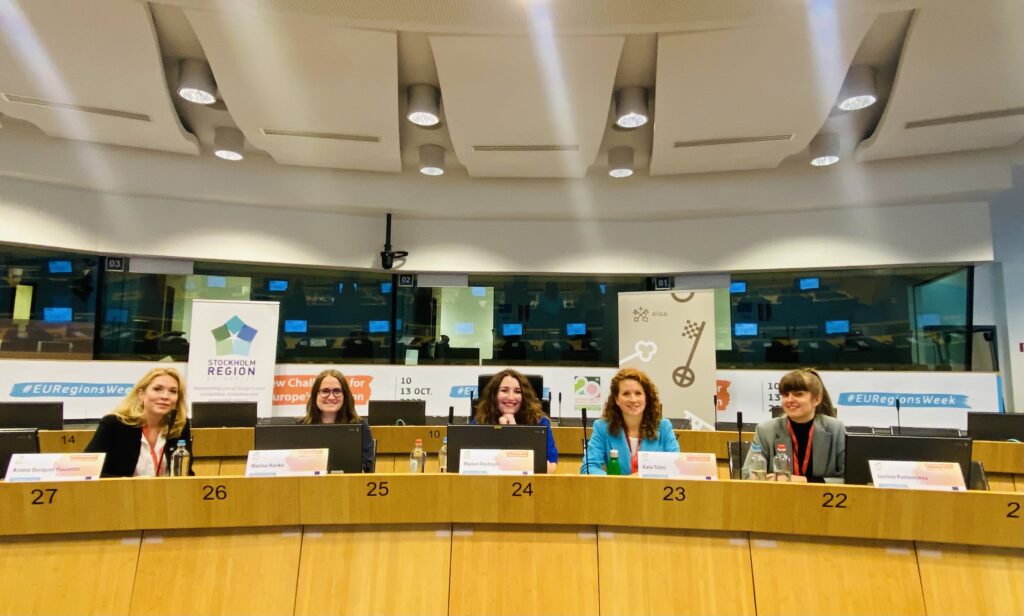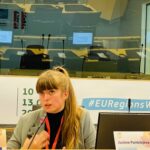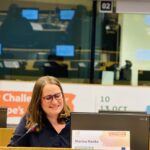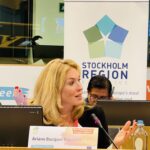
On Monday the 10th of October, Capital Cities and Regions Network (CCRN) with Stockholm Region EU Office as a lead partner, held a workshop with focus on: “Empowered youth - a better future in EU capital cities and regions”, as apart of the European Week of Regions and Cities. (Se den svenska versionen nedan.)
The workshop “Empowered youth – a better future in EU capital cities and regions” was organised by CCRN, this year represented by the cities Stockholm, Riga, Vienna, Budapest and Bratislava Region, and was an official part of the European Week of Regions and Cities.
Speaking in the panel were Ms. Justine Pantelejeva, member of the Riga City Council; Ms. Mariana Hanke, vice-chairwoman for the Vienna City Council Committee of European Affairs; Ms. Kata Tüttö, vice-mayor for Budapest and member of the European Committee of the Regions, Ms. Ariane Bucquet Pousette, project manager for startups at Invest Stockholm, and Mr. Juraj Droba, president of the Bratislava Region, via a video. Moderating the panel did Ms. Manon Deshayes, Policy Officer at the platform European Youth Forum.
The presentations
The speakers presented initiatives and projects for reaching and engaging youth, with a special focus on education, young women and digital skills.
 Justine Pantelejeva, from Riga, presented an initiative using the video game Minecraft as an important tool for involving women in the development of the city. The students are provided access to the platform through their schools, as well as access to the Minecraft world containing a full-scale model of the city of Riga.
Justine Pantelejeva, from Riga, presented an initiative using the video game Minecraft as an important tool for involving women in the development of the city. The students are provided access to the platform through their schools, as well as access to the Minecraft world containing a full-scale model of the city of Riga.
 Marina Hanke, from Vienna, presented a daughter’s day project, where girls can spend a school day at an enterprise with focus on technological or digital labour. Ms. Hanke also presented an initiative with the purpose of getting more girls and young women interested in STEM-professions, by giving them a hands-on opportunity of working with robotics, coding, AI, and more.
Marina Hanke, from Vienna, presented a daughter’s day project, where girls can spend a school day at an enterprise with focus on technological or digital labour. Ms. Hanke also presented an initiative with the purpose of getting more girls and young women interested in STEM-professions, by giving them a hands-on opportunity of working with robotics, coding, AI, and more.

Kata Tüttö, from Budapest, spoke about women’s role in urban planning and problematized that young women are missing from public spaces. Cities needs a rethink and redesign in order to resolve the problem. Ms. Tüttö also mentioned the current energy crisis and how it can lead to darkened streets and therefore a decrease in security, especially for women.
 Ariane Pousette, from Invest Stockholm presented Stockholm city’s work on making it “a woman’s place” and the process towards equality. Ms. Pousette also presented a few important initiatives for involving more women in enterprises, with Starta eget Stockholm, Stockholm Scaleup Programme, and Stockholm – A Woman’s Place being among these initiatives.
Ariane Pousette, from Invest Stockholm presented Stockholm city’s work on making it “a woman’s place” and the process towards equality. Ms. Pousette also presented a few important initiatives for involving more women in enterprises, with Starta eget Stockholm, Stockholm Scaleup Programme, and Stockholm – A Woman’s Place being among these initiatives.
 Jurai Droba, from Bratislava Region, presented in a video testimonial that the region have established a youth parliament, with the purpose of connecting regional administration with youth organizations and initiatives to improve the situation for youth in the city.
Jurai Droba, from Bratislava Region, presented in a video testimonial that the region have established a youth parliament, with the purpose of connecting regional administration with youth organizations and initiatives to improve the situation for youth in the city.
“The Bratislava Region supports the access of girls and young women to the tech sector where they are underrepresented. In order to embrace potential of young women in the ICT skills, we support secondary schools run by the region to get involved in projects and programmes of the association “You too in the IT sector”. Our objective is to build a technologically equal society and ensure that women do not remain behind in the technological future.” – Jurai Droba, president of Bratislava Region.
The discussions
The presentations were followed by a discussion, were the issue of barriers and solutions for involving more women in tech was at the focal point. Among other things, there was an unanimity that stereotypes made a large barrier, resulting in women and men being treated differently and having different expectations being set in the workplace. Learning from each other, through networking and cooperation, as well as listening to the experiences of many women, was perceived as an important tool for regions and cities to breach these barriers. Ms. Pousette summarized this well:
”Meeting women, sharing experiences from all over Europe and discuss key barriers and potential solutions about gender equality is important to create a better tomorrow for Europe and for our own countries and cities” – Ariane Pousette, Invest Stockholm.
Please find the recording of the workshop here.
/Rebecca Timm, Strategic communicator and Gustaf Borelius, Trainee at Stockholm Region EU Office
———————————————————————————————————————————————————————————————————————————————————–
Måndagen den 10 oktober anordnade huvudstads-och regionsnätverket CCRN (capital cities and regions network), där Stockholmsregionens Europakontor ingick som huvudarrangör, ett seminarium med fokus på att stärka ungdomars röst: ”Empowered youth – a better future in EU capital cities and regions”. CCRN representerades det här året av städerna Stockholm, Riga, Wien, Budapest och region Bratislava och seminariet var en del av den Europeiska veckan för regioner och städer.
Medverkade gjorde Justine Pantelejeva från Rigas statsfullmäktige, Mariana Hanke, vice ordförande för Wien stadsfullmäktiges kommitté för EU-frågor, Kata Tüttö, biträdande borgmästare för Budapest och medlem i regionkommitén, Ariane Bucquet Pousette, projektledare för startups i Invest Stockholm och Juraj Droba, president för region Bratislava, via video. Talarna berättade om sina respektive storstadsregioners eller städers arbete med att nå, engagera och lyssna på ungdomar och ett speciellt fokus hölls på utbildning, unga kvinnor och digitala förmågor. Moderator var Manon Deshayes, Policyhandläggare på plattformen European Youth Forum.
Presentationer
Justine Pantelejeva från Riga presenterade ett initiativ med datorspelet Minecraft som verktyg för att engagera ungdomar i stadens utveckling. Eleverna får tillgång till plattformen via skolan, samt tillgång till en minecraftvärld med staden i full skala.
Marina Hanke från Wien presenterade bland annat ett ”daughter’s day”-projekt, där flickor får spendera en skoldag på ett företag med fokus på teknologisk eller digitalt arbete. Hanke presenterade även ett initiativ som syftar till att intressera fler tjejer i STEM-yrken, genom att få testa på robotik, kodning, AI, med mer.
Kata Tüttö från Budapest talade om kvinnors roll i urban stadsplanering och problematiserade att unga kvinnor saknas från allmänna ytor. Städer behöver designas och tänkas om för att lösa det problemet. Tüttö belyste även att den pågående energikrisen kan leda till att gator släcks ner och att otryggheten därmed ökar, framför allt för kvinnor.
Ariane Pousette från Invest Stockholm berättade om Stockholms stads arbete med att profilera sig som ”en kvinnas plats” och deras arbete med jämställdhet. Pousette presenterade också några viktiga initiativ för att involvera fler kvinnor i företagande, bland annat ”Starta eget Stockholm”, ”Stockholm Scaleup Programe” och ”Stockholm A Woman’s Place”.
Jurai Droba från Bratislava berättade i ett inspelat tal bland annat att regionen bildat ett ungdomsparlament, som ska koppla ihop regional förvaltning med ungdomsorganisationer och deras initiativ för att förbättra ungdomars situation.
“Region Bratislava stödjer vinnor i tech-industrin där de är underrepresenterade. För att gynna unga kvinnor som har kompetens inom ICT, stödjer vi regionala utbildningar som ger möjlighet att bli involverad i projekt och utbildningar, exempelvis föreningen “You too in the IT sector”. Vårt mål är att ett teknologiskt jämställt samhälle och säkerställa att kvinnor inte hamnar i utanförskap i den teknologiska framtiden.” – Jurai Droba, president för region Bratislava.
Diskussion
Presentationerna följdes sedan av en diskussion, där den centrala frågan handlade om vilka hinder och lösningar som finns för att inkludera kvinnor i tech-industrin. Bland annat uttrycktes det en enighet om att stereotyper var ett stort problem, som resulterar i att kvinnor och män behandlas olika utifrån olika förväntningar på sin arbetsplats. Att lära sig av varandra, genom nätverkande och samverkan, samt att lyssna på kvinnors erfarenheter, ansågs också som ett viktigt verktyg för städer och regioner att överbrygga dessa hinder för kvinnor. Ariane Pousette sammanfattade det väl:
“Att möta kvinnor, dela erfarenheter genom hela Europa och diskutera de främsta hindren och potentiella lösningar gällande ojämlikhet, är ett viktigt steg mot en bättre framtid för Europa och dess länder och städer” – Ariane Pousette, Invest Stockholm.
Se det inspelade seminariet här.
/Rebecca Timm, Strategisk kommunikatör och Gustaf Borelius, trainee på Stockholmsregionens Europakontor i Bryssel